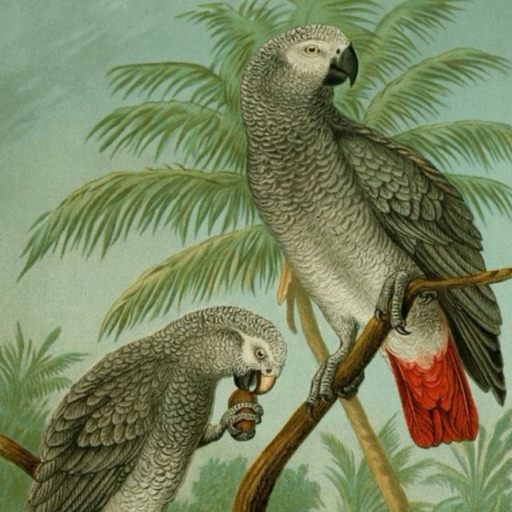- Exhibition
- Awards
- Library
- Speech
- edition KHM
- Festival / Award ceremony
- FG exMedia
- FG Film und TV
- FG Kunst
- FG Kunst- und Medienwissenschaften
- Movie screening
- Glasmoog Books
- Glasmoog - Raum für Kunst und Diskurs
- KHM Journal
- Concert
- Cooperation
- LAB Jahrbuch
- LECTURE Reihe
- Teachers elsewhere
- literature
- off topic
- News articles
- Publications
- Job offers
- Study
- TV broadcast
- Event
- all
Parrot Terristories:
Rethinking More-than-Human History, Conservation, Care, and Colonial Legacies
Rethinking More-than-Human History, Conservation, Care, and Colonial Legacies

TA T — Tieranatomisches Theater, Zentrum für Kulturtechnik, HU Berlin Campus Nord, Philippstraße 13/Haus 3
10115 Berlin
With
Nancy Jacobs, Brown University, Providence, USA
Katja Kaiser, Museum for Natural History, Berlin
André Krebber, University of Kassel
Munyaradzi Elton Sagiya, Bindura University, Zimbabwe and Humboldt-Universität zu Berlin
In conversation with
Ute Hörner and Mathias Antlfinger.
Moderated by Felix Sattler, TA T
5 pm Tour of the exhibition with artists Ute Hörner and Mathias Antlfinger
6 – 8.15 pm Round table discussion
The transdisciplinary roundtable, which is part of Hörner/Antlfinger: Parrot Terristories exhibition at TA T – Tieranatomisches Theater, investigates intersections of more-than-human global history, animal agency, conservation, care, and colonial legacies. The panel examines how African grey parrots make culture in freedom—expressing complex social behaviors, cognition, and adaptability—and how captivity disrupts these processes. This commodification of parrots serves as a lens for broader histories of exploitation and the ethical challenges of conservation. The roundtable further explores the role of indigenous knowledge and practices in rethinking conservation and highlights the need to decolonize approaches that reflect interconnected human and nonhuman histories. By critiquing the colonial provenance of natural history collections, the discussion reveals how power dynamics have shaped preservation ethics and interpretation. Linking these perspectives, the roundtable envisions equitable conservation and museum practices that emphasize shared responsibilities across species and cultures. The event will be held in English.
The event will be held in English.
Venue: TA T — Tieranatomisches Theater, Zentrum für Kulturtechnik, HU Berlin Campus Nord, Philippstraße 13/Haus 3
Nancy Jacobs, Brown University, Providence, is a historian and author of the book The Global Grey Parrot: The Worldwide History of a Charismatic African Animal. She is very much concerned with animals as historical actors and parrots as political, cultural, and world-making creatures. She is also interested in human efforts to improve life for parrots in captivity and to conserve the birds’ existence in their native forests.
Katja Kaiser, Museum for Natural History Berlin, Research associate in the project “Guidelines for the handling of natural history collections from colonial contexts”. Katja Kaiser collaborated with Ute Hörner and Mathias Antlfinger on their work “One of Thirtysix” that traces the provenance of single grey parrot specimen from the museum’s collection
André Krebber, guest fellow in cultural history and theory at LeipzigLab at Leipzig University and adjunct lecturer at the University of Kassel. André's interested in knowledge cultures and how they shape and are shaped by human-nature relations with a particular focus on the role of nonhuman animals therein to respond to the current environmental crisis. In his forthcoming book The Forgotten Animal, he proposes an aesthetic practice of animal remembrance that makes the recognition of animal self-determination the foundation for overcoming appropriating relations to nature.
Munyaradzi Elton Sagiya, Lecturer, Culture and Heritage Studies (CHS) at Bindura University, Zimbawe and Research Fellow at inherit. heritage in transformation at the Humboldt-Universität zu Berlin. His research interests include decolonising heritage conservation practices, African archeology, and museology.
Ute Hörner and Mathias Antlfinger are professors of multispecies storytelling at the Academy of Media Arts Cologne and have been living together in a multispecies household with grey parrots for over 20 years. Their installations, videos and sculptures deal with relationships between humans, animals and machines and open up critical perspectives on changeable social constructs as well as utopian visions of equal interaction. Their communal living with non-human animals is characterised by shared social actions and how these produce a shared space. In 2014, Hörner/Antlfinger founded the interspecies collective CMUK with the grey parrots Clara and Karl, who are also contributing artistic works to the current exhibition.
Felix Sattler is head and curator of the TA T – Exhibition Research Space at the Centre for Cultural Techniques, Humboldt-Universität zu Berlin. His curatorial strategy aims to foster dialogue between a variety of communities. Felix Sattler's projects have addressed topics as diverse as the art and design history of unicellular algae, an archaeology of the multiple past, and the postcolonial controversies surrounding museums and human remains.
- Exhibition
- Awards
- Library
- Speech
- edition KHM
- Festival / Award ceremony
- FG exMedia
- FG Film und TV
- FG Kunst
- FG Kunst- und Medienwissenschaften
- Movie screening
- Glasmoog Books
- Glasmoog - Raum für Kunst und Diskurs
- KHM Journal
- Concert
- Cooperation
- LAB Jahrbuch
- LECTURE Reihe
- Teachers elsewhere
- literature
- off topic
- News articles
- Publications
- Job offers
- Study
- TV broadcast
- Event
- all







